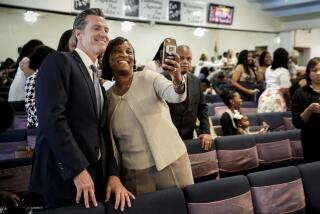Clinton Withdraws Guinier as Nominee for Civil Rights Job : Justice Department: President does not want to fight divisive battle in Senate. He says he had not read her controversial writings, some of which he disagrees with.
- Share via
WASHINGTON — President Clinton, saying that he could not fight a divisive, distracting uphill battle defending positions he did not believe in, Thursday night withdrew the nomination of C. Lani Guinier to head the civil rights division of the Justice Department.
Clinton said that he had not read the University of Pennsylvania law professor’s controversial writings about ways to assure greater political power to blacks when he chose her last April, adding: “Had I read them before I nominated her I would not have done so.”
Although Guinier’s writings had come under blistering attack from conservatives and Senate Democrats had indicated that they would have trouble confirming her, a visibly unhappy Clinton insisted:
“It is not the fear of defeat that has prompted this decision. It is the certainty that the battle would be carried on a ground that I could not defend.”
The decision to withdraw the nomination followed an angry, hourlong meeting in the Oval Office in which Guinier appealed to the President to give her an opportunity to defend her views before the Senate and the nation.
“It was one of the most difficult meetings I have had in my life,” Clinton said.
The President, who has known Guinier personally since they were students at Yale Law School, said he had not delved into her work--much of it law review articles dealing with black representation in local and federal legislative bodies--until Thursday.
Clinton’s admission that he had put Guinier’s name forward without understanding her positions on some of the most politically sensitive issues in American life--the issues her office would oversee--was a stunning acknowledgment that seems certain to add to the already serious questions of White House competence.
The Guinier controversy is only the latest in a series of self-inflicted wounds that have sent Clinton’s public approval ratings plummeting and put his entire domestic program at risk.
He denied that pulling back on the nomination was part of a larger White House strategy of moving toward the political center to rally support for the beleaguered Administration’s economic and other programs.
“It’s not about the political center. It’s about my center,” he said. “I got more pressure to stay with this than to drop it.”
Clinton’s action came after a day in which black lawmakers and civil rights leaders--angry, frustrated and threatening--bombarded a hunkered-down White House with calls to stand behind the nomination and not pull the plug on Guinier before she had had her day in court.
Rep. Kweisi Mfume (D-Md.), chairman of the Congressional Black Caucus, released a telegram that he had sent to Clinton on behalf of black lawmakers “to urge you in the strongest possible terms to maintain your support for Lani Guinier.”
Mfume said that the lack of White House support for Guinier after she became a target of conservatives’ attacks because of her views on black political power brought to mind the way Democrats failed to support Anita F. Hill after the Oklahoma University law school professor leveled charges of sexual harassment against Clarence Thomas during his 1991 Supreme Court confirmation hearings.
“We are not here to intimidate (Clinton),” Mfume said. “At the same time, we’re not prepared to roll over and play dead and watch this woman humiliated, undercut and undermined by whispering campaigns and innuendoes.”
Refusing to concede defeat even though the White House had made crystal-clear its lack of interest in fighting to rescue Guinier’s nomination, the leaders of a wide array of black-run and liberal organizations--including the National Assn. for the Advancement of Colored People and the black caucus--went to the White House Thursday for a series of private meetings to caution the President that he risked offending black Americans if he backed away from Guinier.
The campaign was waged in public as well.
NAACP Executive Director Benjamin Chavis Jr., during a luncheon speech at the National Press Club, demanded that Clinton stand with Guinier and force members of the Senate Judiciary Committee to bring their quarrels with her views into the open during confirmation hearings. Guinier and her supporters have argued that, if given a fair hearing, her ideas would not prove unacceptable.
“While everybody is looking at the White House, I’m looking at the Senate that is putting pressure on the White House to withdraw the Lani Guinier nomination,” Chavis said.
“You did the right thing by nominating her, now continue to do the right thing by giving her your support,” he said, addressing Clinton. “Put it in the lap of the Senate Judiciary Committee. Let them decide whether or not this woman . . . is qualified to be assistant attorney general of the United States. That is the least a President could do.”
In comments designed to invoke the Thomas-Hill hearings, Chavis said: “If the Republicans can demand a fair hearing for Clarence Thomas, I can’t see why the Democrats can’t demand a fair hearing for Lani Guinier.”
When Clinton aides were not meeting with civil rights activists and others supporting Guinier, they were huddling among themselves. Atty. Gen. Janet Reno, who has been the most outspoken Administration official in support of Guinier, joined in the deliberations. So did former civil right leader and Washington attorney Vernon Jordan, who served as Clinton’s transition chairman.
To avoid discussing the Guinier nomination, White House staff members canceled the daily briefings but announced that the President would offer a statement before the day ended.
Around 7 p.m., Guinier arrived at the White House for conversations with Clinton and White House Chief of Staff Thomas (Mack) McLarty. She left about an hour and half later without commenting to waiting reporters.
More to Read
Sign up for Essential California
The most important California stories and recommendations in your inbox every morning.
You may occasionally receive promotional content from the Los Angeles Times.











